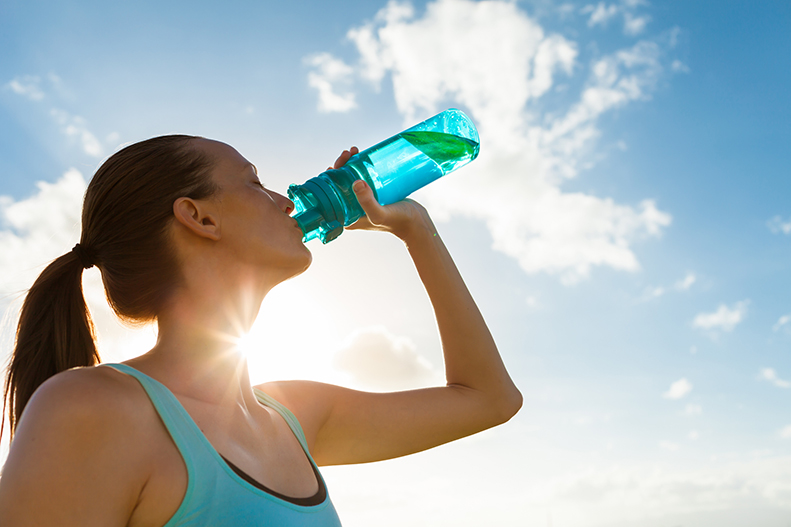
Categories
How Much Water Should You Drink a Day?
Hydration is one of those universal truths of health that, despite being widely acknowledged, is often surrounded by misconceptions and overlooked in daily routines. The significance of staying hydrated extends far beyond simply quenching thirst; it’s a cornerstone of maintaining optimal physical and mental health. Yet, many of us find ourselves navigating through a sea of conflicting advice on how much water we should drink daily. Is it the often-cited eight glasses, more or perhaps less? And how do our lifestyle, climate, and physical activity influence our hydration needs?
Hydration’s role in our lives is multifaceted. It affects everything from our energy levels and concentration to our ability to lose fat and gain muscle efficiently. Think of water as the most basic yet essential nutrient your body needs to function at its best. It involves countless bodily processes, including digestion, nutrient absorption, and temperature regulation.
Despite its importance, many of us are walking around in a state of low-grade dehydration, attributing feelings of fatigue, irritability, and even hunger to everything but a lack of water.
Hydration
Hydration provides the body with the necessary fluids to function optimally. Water is the most crucial component of this process, as it makes up about 60% of the human body’s weight and plays a pivotal role in nearly every bodily function. Understanding the importance of hydration begins with recognising water’s involvement in digestion, energy production, and cellular efficiency.
Digestion and Nutrient Absorption:
Water is essential for digestion. It aids in breaking down food, allowing your body to absorb the nutrients. It’s also crucial for dissolving minerals and nutrients, making them accessible to the body. Adequate hydration ensures the digestive system works smoothly and prevents common issues like constipation and acid reflux.
Energy Production and Cellular Efficiency:
Every cell in your body needs water to function correctly. Water is involved in the metabolic process, helping to convert food into energy. Hydrated cells are more efficient, functioning optimally in carrying out their roles. This efficiency boosts your metabolism, aiding in weight management and energy levels throughout the day.
Detoxification:
Water helps flush toxins from your body through urination and sweat. This natural detoxification process is critical for preventing the build-up of harmful substances that can affect your health.
Even mild dehydration can significantly decline physical performance. Water is vital for maintaining blood volume, regulating body temperature, and ensuring muscle function. During exercise, your body loses fluids through sweat, and failure to replenish these can lead to decreased strength, stamina, and agility. For athletes or anyone engaged in physical activity, staying hydrated is vital to maximising performance and recovery.
Cognitive functions and emotional well-being are also closely linked to hydration. Studies have shown that even mild dehydration can impair concentration, memory, and mood. Adequate hydration helps maintain brain function, promotes mental clarity, and can reduce the risk of headaches and migraines. Furthermore, being well-hydrated is associated with better sleep quality and stress management, highlighting its role in emotional health.
Your Body’s Water Needs
Determining how much water you need isn’t a one-size-fits-all calculation. Several factors come into play, making your hydration requirements unique to you.
Factors Influencing Hydration Needs
Body Weight:
Generally, a larger body requires more water. This is because water needs are proportionate to body surface area and weight. More body mass means more tissue that requires hydration.
Activity Level:
The more active you are, the more water you lose through sweat and need to replenish. Regular exercisers or those with physically demanding jobs must increase their water intake to compensate for these losses.
Climate:
Living in or visiting areas with warmer climates or high humidity increases perspiration, thus increasing the need for fluid. The UK’s variable weather means that you’ll need to drink more water on hotter days or during heatwaves than on cooler, overcast days.
Health Conditions and Medications:
Certain health conditions, such as diabetes or heart disease, and medications like diuretics can affect hydration needs. Adjusting water intake based on health status or consulting with a healthcare provider for specific recommendations is crucial.
The “Litre per 25kg of body weight” Guideline
The “litre per 25kg of body weight” guideline is a practical starting point for estimating your hydration needs. For every 25kg of your body weight, you should aim to drink approximately one litre of water daily. For instance, a person weighing 75kg should target around 3 litres daily. This guideline provides a baseline, but remember, the factors mentioned earlier must be considered to fine-tune your actual needs. It serves as a helpful framework for us in the UK, considering the temperate climate and acknowledging individual lifestyle and health factors.
Recognising the early signs of dehydration can help prevent its adverse effects. Indicators include:
- Thirst is an obvious but sometimes overlooked sign. If you feel thirsty, you’re already mildly dehydrated.
- A healthy hydration level typically results in light yellow or almost clear urine. Darker urine can be an indicator of dehydration.
- Lack of water affects your energy levels and can lead to feelings of weakness or lightheadedness.
- Dehydration reduces saliva production, making your skin feel dry or less elastic.
- Dehydration can cause headaches or exacerbate migraine symptoms.
By understanding and responding to these signs, you can take proactive steps to maintain adequate hydration, enhancing your health and well-being.
Benefits of Adequate Water Intake
Adequate hydration is not just about preventing the negatives associated with dehydration; it plays a crucial role in enhancing various aspects of health and well-being. From facilitating fat loss and muscle gain to boosting cognitive functions, the benefits of maintaining optimal fluid levels are extensive.
Fat Loss:
Hydration is crucial in lipolysis, the breakdown of fats and other lipids to release fatty acids used for energy. Drinking enough water can increase your metabolism, helping your body to burn fat more efficiently. Moreover, water can act as a natural appetite suppressant, leading you to eat less and potentially lose weight.
Muscle Gain:
Muscles comprise approximately 80% water, highlighting the importance of hydration for muscle growth and repair. Adequate water intake supports the synthesis of proteins and nucleic acids, crucial processes for muscle development. Proper hydration also contributes to maintaining electrolyte balance, which is essential for muscle strength and contraction during exercise.
Metabolic Efficiency:
Water is vital for the body’s metabolic processes, including energy production. Adequate hydration ensures that biochemical reactions proceed at a sufficient rate, supporting overall metabolic health. A well-hydrated body is more efficient at converting food into energy, facilitating better nutrient absorption and utilisation.
Mood Enhancement:
Dehydration has been linked to mood disturbances, such as feelings of anxiety and irritability. Keeping hydrated can help maintain a balanced mood and overall emotional well-being. Studies have shown that even mild dehydration can negatively impact mood, whereas adequate hydration can enhance a sense of positivity and calm.
Reducing Fatigue:
Chronic dehydration can contribute to fatigue and lethargy. Ensuring you’re drinking enough water can help your body maintain optimal blood volume, improving circulation and oxygen flow to your brain and throughout your body. This can significantly reduce the sensation of tiredness, boosting your energy levels.
Improvement in Concentration and Memory:
Water is essential for maintaining brain function. Adequate hydration has been shown to improve focus, concentration, and memory recall. The brain requires a delicate balance of water and various elements to function correctly; even slight dehydration can impair cognitive processes, leading to decreased attention span and memory problems.
How Much is Too Much?
While staying hydrated is well-documented, it’s equally crucial to be aware that there is such a thing as too much water. Overhydration, or water intoxication, occurs when water intake exceeds your body’s ability to excrete it. This can lead to an imbalance in electrolytes, particularly sodium, resulting in a condition known as hyponatremia.
Overhydration can disrupt the balance of electrolytes, substances necessary for normal body function, by diluting the sodium in the bloodstream. Electrolytes are pivotal for transmitting electrical messages in the body, and their imbalance can hinder this essential communication, affecting everything from muscle contractions to nerve signalling.
Symptoms of Hyponatremia
Hyponatremia manifests when sodium levels in the body drop dangerously low due to excessive water intake. Symptoms can range from mild to severe, including:
- Nausea and vomiting
- Headache
- Confusion or disorientation
- Loss of energy and fatigue
- Muscle weakness, spasms, or cramps
- Seizures
The severity of symptoms often correlates with the rapidity and extent of the drop in sodium levels. Acute hyponatremia can develop quickly and requires immediate medical attention to prevent life-threatening complications.
Avoiding Overhydration
Listening to your body’s signals is essential to avoid the risks associated with overhydration. Drinking when thirsty and moderating your intake based on activity level and environmental conditions can help maintain a healthy balance. Here are some strategies:
Monitor Fluid Intake:
While following general guidelines, ensure your water consumption aligns with your personal needs, considering factors like body weight, activity level, and climate.
Pay Attention to Thirst:
Thirst is a reliable indicator of your body’s need for fluids. Drink when thirsty, and don’t force yourself to drink beyond satiety.
Consider Your Diet:
Foods, especially fruits and vegetables, can significantly increase your daily water intake. If you consume a lot of high-water-content foods, you may not need to drink as much water.
Be Mindful During Exercise:
While replacing lost fluids during exercise is essential, be cautious not to overdo it. Balance your water intake with your sweat loss, and consider using electrolyte replacements during long-duration or high-intensity workouts.
Recognise Personal Factors:
If you have health conditions that affect water retention or are on medications that influence fluid balance, speak to your personal trainer to tailor your hydration strategy accordingly.
Tips for Increasing Daily Water Intake
Meeting their daily water intake goals can be challenging for many, especially with busy schedules and varying lifestyle demands. Fortunately, incorporating more water into your daily routine can be straightforward with some practical and easy methods. Here are tips designed to help individuals from all walks of life increase their hydration effectively.
- Use Visual Cues
Visual cues are one of the simplest ways to ensure you’re drinking enough water. A 2-litre bottle is an excellent tool for this purpose. A visual representation of your daily water goal can motivate you to drink regularly throughout the day. Plus, it’s an easy way to track your progress. If you’re often on the go, consider carrying a reusable water bottle with measurements marked on the side.
- Set Regular Reminders
Technology can be a valuable ally in your hydration efforts in the digital age. Setting reminders on your phone or computer can prompt you to take water breaks at regular intervals. Numerous apps are also available that not only remind you to drink water but also help you log your intake and monitor your progress over time.
- Start Small and Gradually Increase
If you’re not used to drinking a lot of water, suddenly increasing your intake can feel overwhelming. Add an extra glass of water to your daily routine and gradually build up to your target amount. This gradual increase can help your body adjust to the higher volume of fluids without feeling forced.
- Enhance Your Water
For some, water’s taste (or lack thereof) can make it less appealing. Infusing water with fruits, vegetables, or herbs is a delicious way to enhance its flavour naturally. Try combinations like cucumber and mint, lemon and lime, or berries for a refreshing twist on plain water.
- Eat Water-Rich Foods
Incorporating foods with high water content into your diet is another effective way to boost your hydration. Fruits and vegetables such as watermelon, cucumbers, oranges, and strawberries contribute to your overall fluid intake and provide valuable nutrients.
- Align Water Intake with Daily Activities
Pairing water intake with daily activities can create a routine that ensures you stay hydrated. Drink a glass of water after every bathroom break, before each meal, or during your commute. These consistent cues can help establish a hydration habit.
- Listen to Your Body
While it’s important to aim for a general daily water intake goal, listening to your body’s signals is crucial. Drink when you’re thirsty and be mindful of your body’s responses to increased water intake, adjusting as needed.
Alternatives to Water for Hydration
While water is the most straightforward way to stay hydrated, it’s not the only option. For those looking for a bit of variety or who might find plain water less appealing, several healthy and hydrating alternatives can contribute to your daily fluid intake. These alternatives can add flavour and nutrients to your hydration strategy, making it more enjoyable to achieve your hydration goals.
Herbal Teas
Herbal teas are a fantastic alternative to water for those looking to increase their fluid intake. Unlike caffeinated teas and coffee, which can have a diuretic effect when consumed in large quantities, herbal teas like chamomile, peppermint, or hibiscus offer hydration without caffeine. They can be enjoyed hot or cold, making them a versatile option for all seasons. For a warming winter drink or a refreshing summer iced tea, herbal teas are an excellent choice for staying hydrated.
Infused Water
Infused water is the way to go if you want to add flavour to your water without the added sugars in many commercial drinks. Adding slices of fruits, vegetables, or herbs to water can infuse it with subtle flavours, making it more appealing to drink. Popular combinations include cucumber and mint, lemon and ginger, or berries and basil. Not only does this enhance the taste, but it also adds a touch of vitamins and antioxidants to your drink.
Fruits with High Water Content
Eating fruits with high water content is another effective way to increase your hydration. Fruits like watermelon, strawberries, oranges, and grapefruit are not only delicious but are also made up of over 90% water. Including these fruits in your diet can boost your hydration while providing essential vitamins and minerals. They’re perfect for a hydrating snack or as part of a meal.
Incorporating these alternatives into your hydration strategy can provide a more balanced and enjoyable approach to meeting your fluid intake needs. They can complement water, ensuring that you stay hydrated throughout the day without relying solely on plain water. It’s essential, however, to be mindful of your choices. While these alternatives can contribute to your overall fluid intake, water should still be the foundation of your hydration efforts due to its unmatched purity and absence of calories, sugars, or additives.
Moreover, these alternatives can offer additional health benefits beyond hydration. Herbal teas can provide calming effects or aid digestion, while fruits with high water content offer a range of vitamins, minerals, and fibre.
Hydration Myths
Hydration is a topic ripe with myths and misconceptions, leading to confusion about best practices for maintaining fluid balance. Let’s address some of the most common myths using evidence-based information, helping to clarify misunderstandings and guide towards healthier hydration habits.
- Caffeinated Beverages Dehydrate You
One of the most pervasive myths is that caffeinated beverages, such as coffee and tea, cause dehydration due to their diuretic effect. While it’s true that caffeine can increase the need to urinate, research suggests that moderate consumption of caffeinated drinks doesn’t significantly affect overall hydration status. For regular caffeine consumers, the body tends to tolerate its diuretic effects. Therefore, caffeinated beverages can contribute to your daily fluid intake, though water should still be your primary source of hydration.
- You Need to Drink 8 Glasses of Water a Day
The advice to drink eight glasses of water a day is a simplification that doesn’t account for individual needs or lifestyle factors. Hydration needs vary greatly depending on body size, activity level, climate, and other health factors. While the “8×8” rule can serve as a rough guideline, it’s important to listen to your body and adjust your water intake according to your needs rather than strictly adhering to a one-size-fits-all rule.
- If You’re Thirsty, You’re Already Dehydrated
While thirst indicates that your body needs fluids, it doesn’t necessarily mean you’re already dehydrated. Thirst is a natural signal from your body prompting you to drink, and responding promptly can help you maintain proper hydration. However, waiting until you’re thirsty is generally fine for most healthy individuals. It’s crucial to anticipate hydration needs during exercise or hot weather and drink before intense thirst sets in.
- Alcohol is Always Dehydrating
Alcohol consumption can have a diuretic effect, leading to increased urine production and potential dehydration. However, the impact of hydration depends on the amount and type of alcohol consumed. Moderate drinking may not severely dehydrate you, especially if you’re consuming water alongside your alcoholic beverages. It’s always good to drink water between alcoholic drinks and ensure you’re well-hydrated before consuming alcohol to mitigate its dehydrating effects.
- The Colour of Your Urine Always Indicates Hydration Levels
While urine colour can be a helpful indicator of hydration, it’s not the sole factor to consider. Pale or clear urine typically signifies good hydration, whereas dark yellow urine suggests you might need to drink more water. However, certain foods, supplements, and medications can alter urine colour independent of hydration status. It would be best to look at other signs of hydration, such as frequency of urination and overall thirst, in addition to urine colour.
We help our members with a nutritional programme that works for them, if you’re struggling, give us a shout at one of our London gyms or try out our personal training classes and we’ll help you work out a plan that suits you.
Related Articles
- The Importance of Hydration
- Do The Basics and Do The Basics Really Well
- Health and Fat Loss In a Nutshell
- Fatigue Masks Fitness
- 5 Hydration Strategies for Optimal Performance in the Gym


